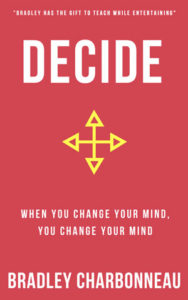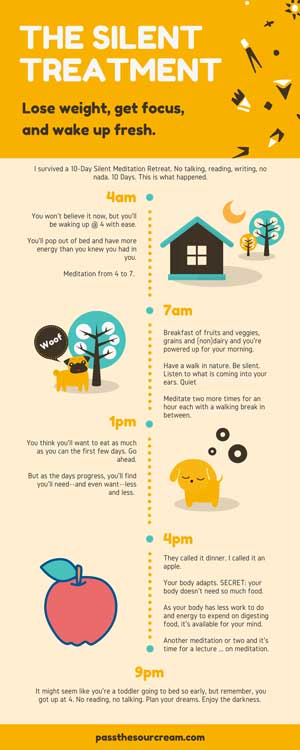
“Wait, I take that back.” Are our decisions reversible?

- I’m pretty sure I just made the world a better place (and it only cost me $4).
- What am I not stepping into and why?
- “Someday” and “never” have the same numerical value in that they both equal zero … and other highlights from “Decide.”
- Decisions: The School Uniform and Releasing Trapped Energy
- The big decisions will help guide the smaller decisions
- That thing you think is going to happen might not happen.
- When you change your mind, you change your mind
- The tiny little secret of the tipping point
- Relief
- When are decisions triggered in the subconscious minds of children?
- Give a Voice to Your Truth and a Truth to Your Voice
- What if you just don’t have the capacity to decide? What if you don’t have a prefrontal cortex? What if you’re, like, a teenager.
- “Wait, I take that back.” Are our decisions reversible?
- Dictatorship or democracy? Which is better for decision-making?
- In a back alley brawl, “Decide” is going to win out over “Hope.”
- Decisions Beget Decisions
- What if the “primary” decisions became the “secondary” decisions?
- Simple but not easy
- Not Simple and Not Easy
- I can’t, uh, decide! Which cover for the “Decide” book!?
- If you build it, they will come. What if you decide? Will they come, too?
- My idea of a good time
- Decision-making, belief, and behavioral biases
- See, Feel, Know | Mind, Heart, Gut
I’ve decided to undecide what I had decided.
Can we undo what we did? Can we reverse the decision?
We hear it all the time in the legal world: the decision has been reversed.
When is a decision not reversible and when is a decision reversible?
If we take things from an extremely simple perspective, we could say, for example, that death is an irreversible decision. Of course, you might then get people who believe in the afterlife or maybe doctors who have the revived people from the dead who say that it’s not a completely irreversible decision.
Or take something as delicate as a pregnancy. In fact, pregnancy is a perfect example of the slippery slope of the decision tree process where what might have been a quick and not very well thought through decision late one night turned into consequences beyond anyone involved short-term decision-making spectrum.
I only just now realized that I have used birth and death as examples of a decision. Let’s take a lighter middle ground and use examples that are a little less permanent.
An easy way to understand the consequences of short-term and long-term decisions is to think about a road trip. If you decide to take the coastal route instead of the inland route the repercussions can be counted in terms of distance and time. Also, they are reversible in that you can get off at the next exit, go back to the interchange and take the inland route after all.
With these two extremes of birth and death and now a much easier to fathom example of a road trip, we can now understand the differences between reversible decisions and irreversible decisions.
Here’s my stance on reversible versus irreversible decisions and one of the main foundations of this book. One of my goals for you (and, of course, for me) is to transform some of the reversible decisions into irreversible decisions.
It’s my belief that by treating a decision as reversible we are taking the easy road and in fact might be choosing to not actually make a decision by treating the decision is reversible. If we see a decision as reversible, it is less powerful, it makes less of an impact on us, and to put it very bluntly, the decision becomes worthless.
I’m not interested in the worthless or cheap decisions. I’m interested in the ones that we previously thought of as reversible and making them irreversible. In other words, to make a decision, to stick with it, to persevere, to be patient with it, to follow it through, to wait it out, to work it out, to treat it as if it’s irreversible to the extent that it becomes ingrained in us that this decision has been made in this, in my opinion, is when the transformation occurs from something that we thought of as reversible to irreversible.
Here are examples of decisions we might think are reversible, but if we morph them into irreversible ones they make an impact:
- I will write every single day for a month. (Gee, what did that decision lead to?)
- I will give up sugar for 30 days.
- I am a painter.
- I will quit my job before the end of the year.
- I am strong.
- I am well.
- I will sell 1,000 books by Dec. 31.
See how these can easily be things that flitter about an go nowhere? Or they dig in and go somewhere. They go from cheap and nothing to value and everything. It’s just that simple.
I’m not talking about chocolate or vanilla ice cream. I’m not talking about birth or death or taxes. I’m talking about “the good stuff,” the important and deep and meaningful elements in our lives that we treat as reversible decisions and this is where I think we can improve.
Those of us who can transform a reversible decision into an irreversible decision are the ones who get things done, are the ones who change their lives and through changing their lives often change the lives of others.
This is what I’m after.

“Wait, I take that back.” Are our decisions reversible? Taking the coastal route. [Photo by Aaron Burden on Unsplash]
Reference
- What We Can Learn from Jeff Bezos about Decision Making “Most decisions should probably be made with somewhere around 70% of the information you wish you had. If you wait for 90%, in most cases, you’re probably being slow. Plus, either way, you need to be good at quickly recognizing and correcting bad decisions. If you’re good at course correcting, being wrong may be less costly than you think, whereas being slow is going to be expensive for sure.” from Jeff Bezos in Real Time Performance
- Go Fast and Break Things: The Difference Between Reversible and Irreversible Decisions “One heuristic might be defaulting to saying no, as Steve Jobs did. Or saying no to any decision that requires a calculator or computer, as Warren Buffett does. Or it might mean reasoning from first principles, as Elon Musk does. Jeff Bezos, the founder of Amazon.com, has another one we can add to our toolbox. He asks himself, is this a reversible or irreversible decision?” from Farnam Street
- 3 Ways Amazon CEO Jeff Bezos Makes Tough Decisions Without Being 100% Sure “Amazon CEO Jeff Bezos recently released his 20th annual letter to shareholders. This one wasn’t just a reminder of how to run a thriving business, but how to run a thriving career. For anyone who wants to speed things up in their business or their life, Bezos’s section on “high-velocity decisions” offers three themes that you can use.” from Fortune
His story may not sound like startup success, but for milder risk-takers like me, it delivers a point that is often made in the startup world: while the consequences of failure are not zero, they are often more temporary than we might expect. — Jeff Bezos in Fortune magazine





























